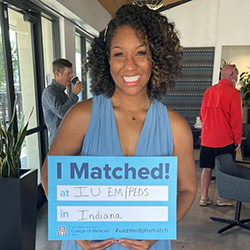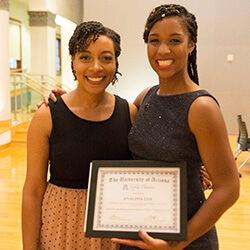
Commencement Profile - Analissa Cox


“During emergency medicine rotation, I found I really enjoyed it. I mean, I just felt at home,” Analissa Cox, a graduating medical student from the University of Arizona College of Medicine – Phoenix, said. “When I did my pediatrics rotation, I felt I could be happy pursuing this specialty too. Never did I know that there was a combined program that I could learn to do both at the same time.”
Cox is thrilled with the flexibility the dual residency program offers. She plans to become board-certified in each specialty.
“What that means for me as far as my career is that I can pretty much work in emergency medicine with adults, with kids and with whomever. I can also be a pediatrician and work in the pediatric hospital or a pediatric clinic. I can work in an emergency room dedicated just to kids. Because I like a lot of change, I thought that that would be just perfect for me.”
In a few short weeks, she’ll experience a change of landscapes with the move from the desert Southwest of Arizona to the rolling Midwest farmland of Indiana. Change is definitely in her future, and it played a great role in her past.
She was doing fine in her life; she had a good job, was earning money and was happy. During her undergraduate courses, she discovered her passion for medicine. Like thousands of medical school applicants each year, she was initially denied. Although she was not accepted to the U of A College of Medicine – Phoenix, the Office of Admissions and Recruitment introduced her to the Pathway Scholars Program.
“When they emailed my rejection letter, it included a paragraph at the end that said, 'We had a lot of competition this year, but we think you'd be really great for the Pathway Scholars Program.' So, I looked into it, and they provided campus orientations. I remember feeling like I was in the right place at that moment.”
The Pathway Scholars Program is designed for Arizona students who desire to pursue a career in medicine. The program helps students who have experienced unique or greater than average challenges preparing for the rigors of medical school. It incorporates a gap year with strong academic support to focus on a curriculum centered on biomedical science and evidence-based instruction.
The strength of the Pathway Scholars Program and its benefits as an admissions pipeline program, led Cox to turn down an offer of admission to another medical school.
“I decided to do the Pathway Program instead of just jumping into medical school, and my reasoning behind that was because I knew what I needed. I knew who I was as a learner, and I thought that doing that extra year getting my feet wet and really understanding what I'm getting myself into was super important for me,” Cox said. “It was the extra reassurance and experience for me of being able to learn how to study. When I started medical school, it was definitely a big jump for me. But I think I really needed that extra year, and I think I've benefited from it greatly.

“I'm not a perfectionist, but I don't like to disappoint myself. I went to her office and told her, 'I don't want to be a subpar doctor.' She said, ‘This is one test, and we've got lots and lots of tests to go. There is nothing subpar about being in medicine, and an African American female, whose odds were already stacked against them.’ I carried that thought with me throughout medical school,” Cox said.
The COVID-19 pandemic heightened awareness of health care disparities for African American, Latinx and Native American populations. Cox is acutely aware of what she represents — less than two percent of all physicians are African American females. For the medical students coming behind her who may be from underrepresented communities, she knows from experience they’ll encounter similar challenges in their journey.
“It’s inevitable that you're going to face patients out there who are just really old school. You’ll experience microaggressions and little things that you can either allow to affect your ability to care for patients, or you can focus on where you're going and what you need to do and brush it off. I think one of the coolest things that's happened to me is when I do come across black patients, black medical students or black doctors, it's always kind of like this, ‘Whoa. I'm so proud of you, and I'm so glad to see you here.’”
To the medical students coming behind her, she encourages them to not compare themselves to anyone.
“I think you need to compare yourself to the person you were yesterday. Ask yourself, 'Am I getting better every day? Am I getting better every week? Am I getting better every month?' You really just need to focus on what you are doing, what your goals are and where you want to be,” Cox said.
About the College
Founded in 2007, the University of Arizona College of Medicine – Phoenix inspires and trains exemplary physicians, scientists and leaders to advance its core missions in education, research, clinical care and service to communities across Arizona. The college’s strength lies in our collaborations and partnerships with clinical affiliates, community organizations and industry sponsors. With our primary affiliate, Banner Health, we are recognized as the premier academic medical center in Phoenix. As an anchor institution of the Phoenix Bioscience Core, the college is home to signature research programs in neurosciences, cardiopulmonary diseases, immunology, informatics and metabolism. These focus areas uniquely position us to drive biomedical research and bolster economic development in the region.
As an urban institution with strong roots in rural and tribal health, the college has graduated more than 1,000 physicians and matriculates 130 students each year. Greater than 60% of matriculating students are from Arizona and many continue training at our GME sponsored residency programs, ultimately pursuing local academic and community-based opportunities. While our traditional four-year program continues to thrive, we will launch our recently approved accelerated three-year medical student curriculum with exclusive focus on primary care. This program is designed to further enhance workforce retention needs across Arizona.
The college has embarked on our strategic plan for 2025 to 2030. Learn more.